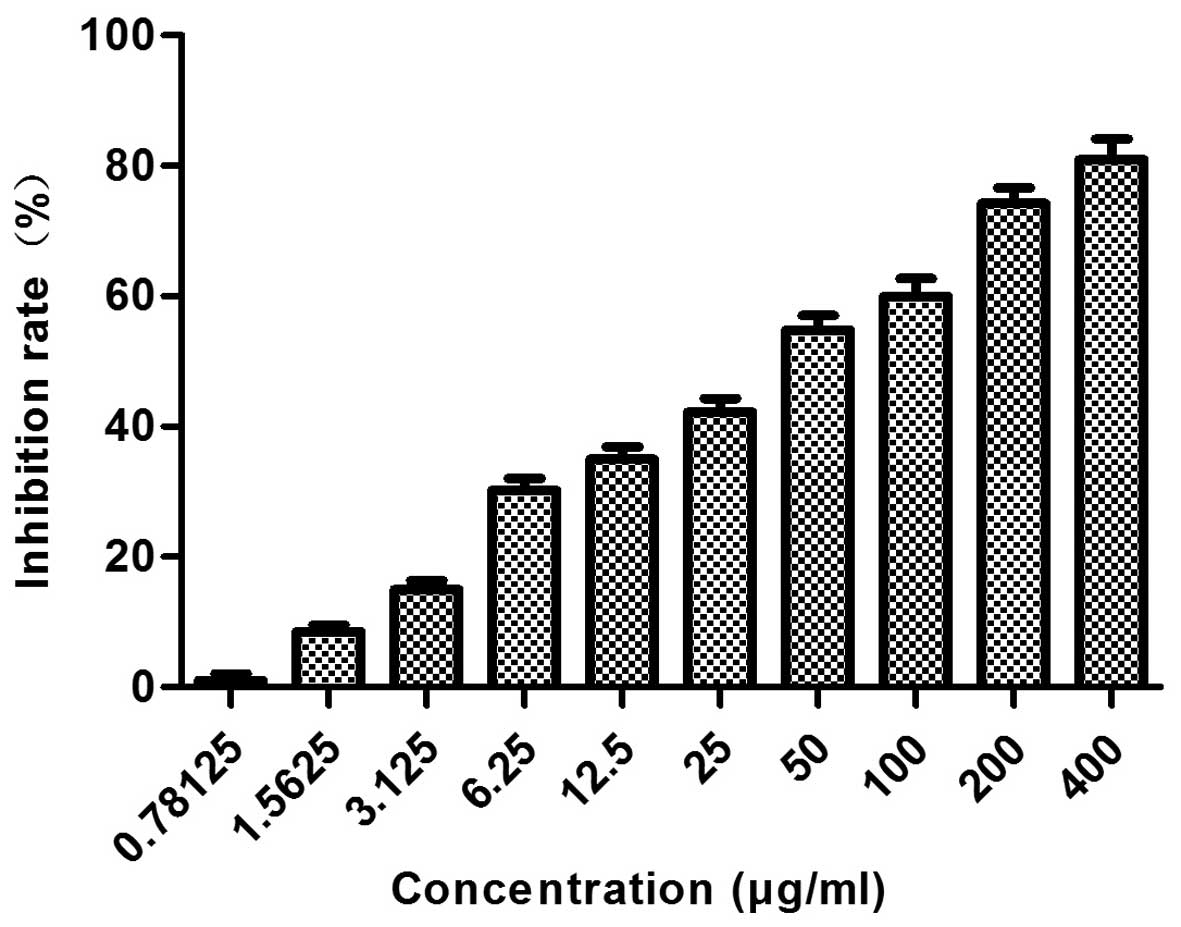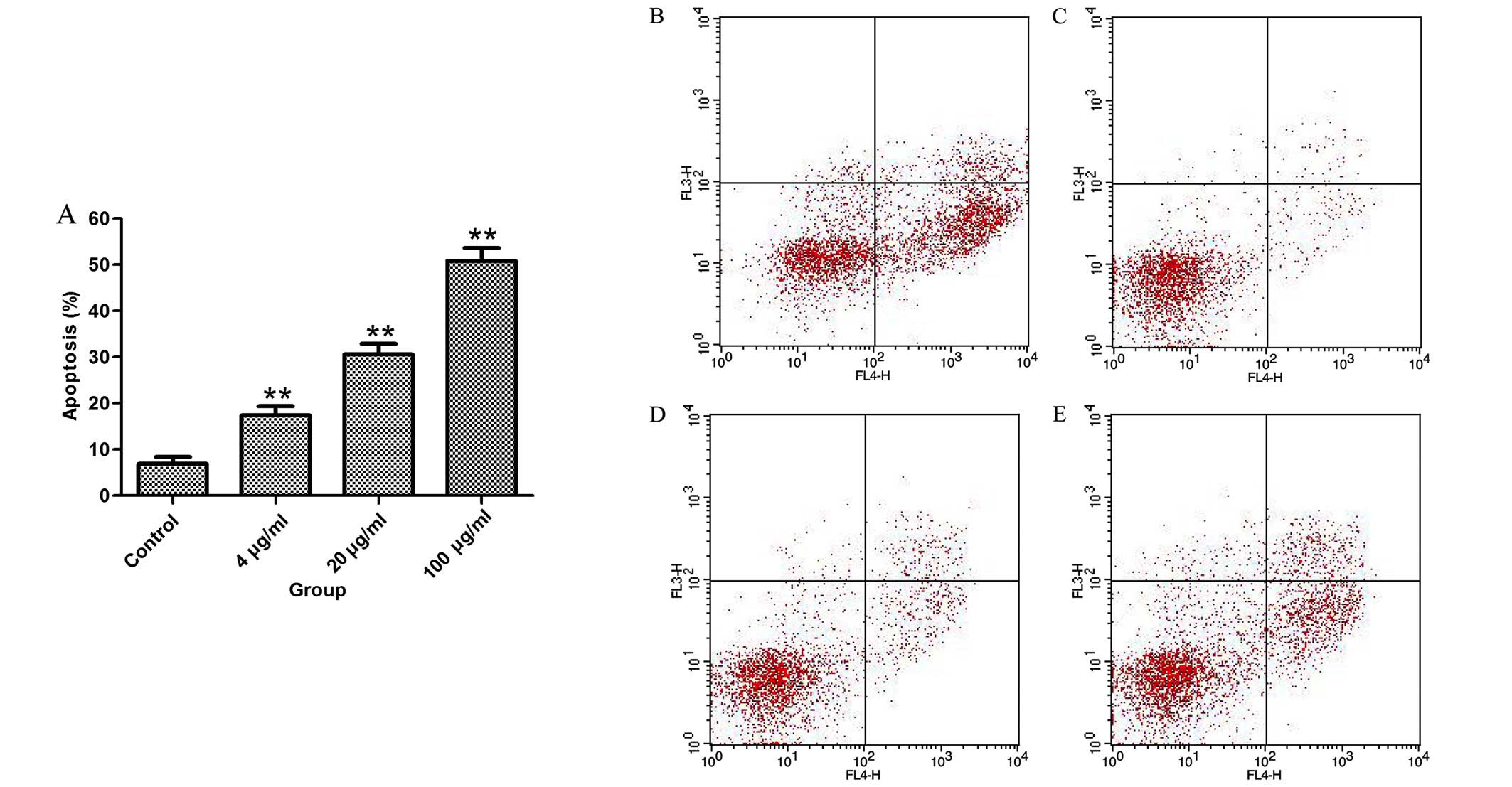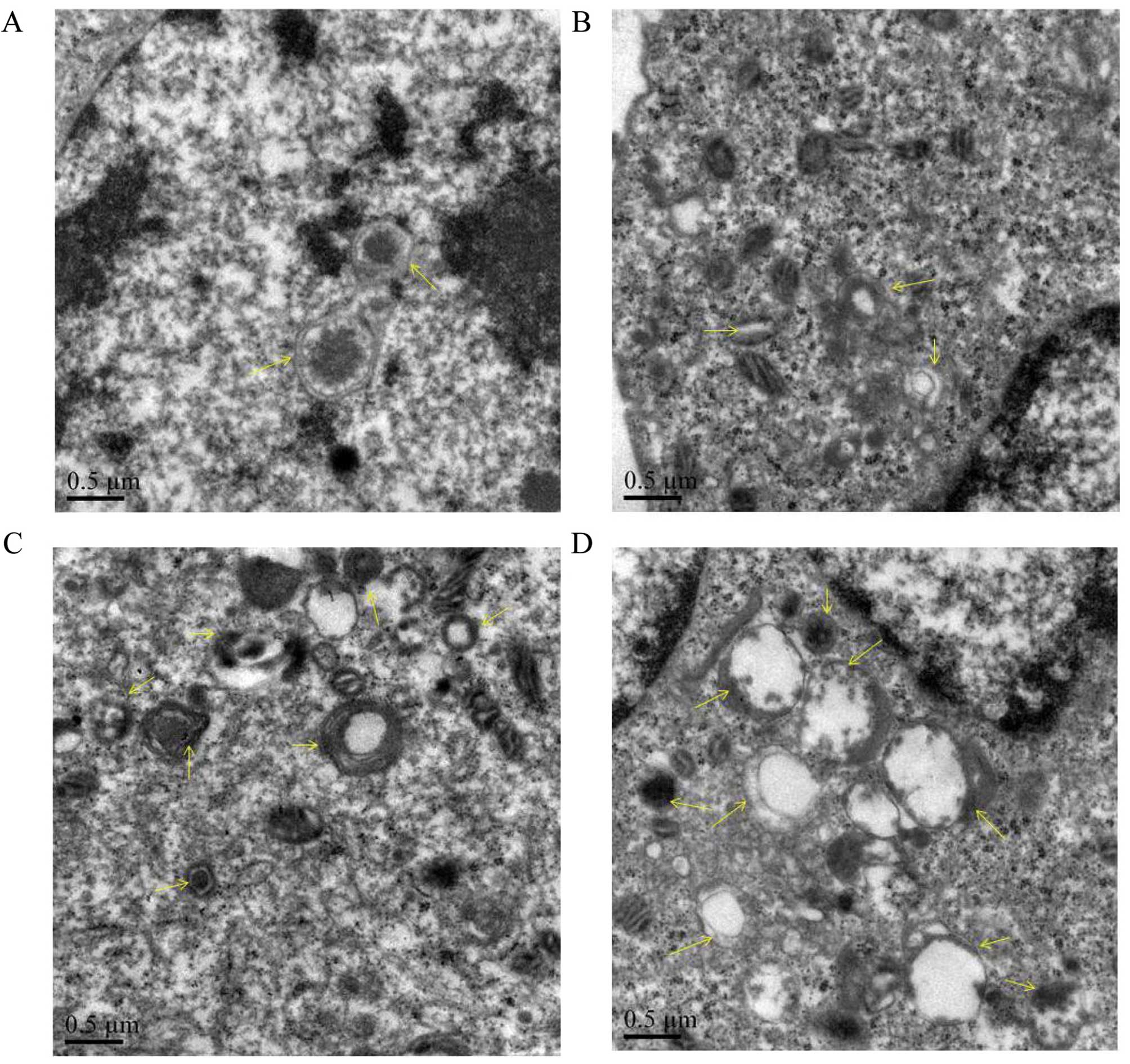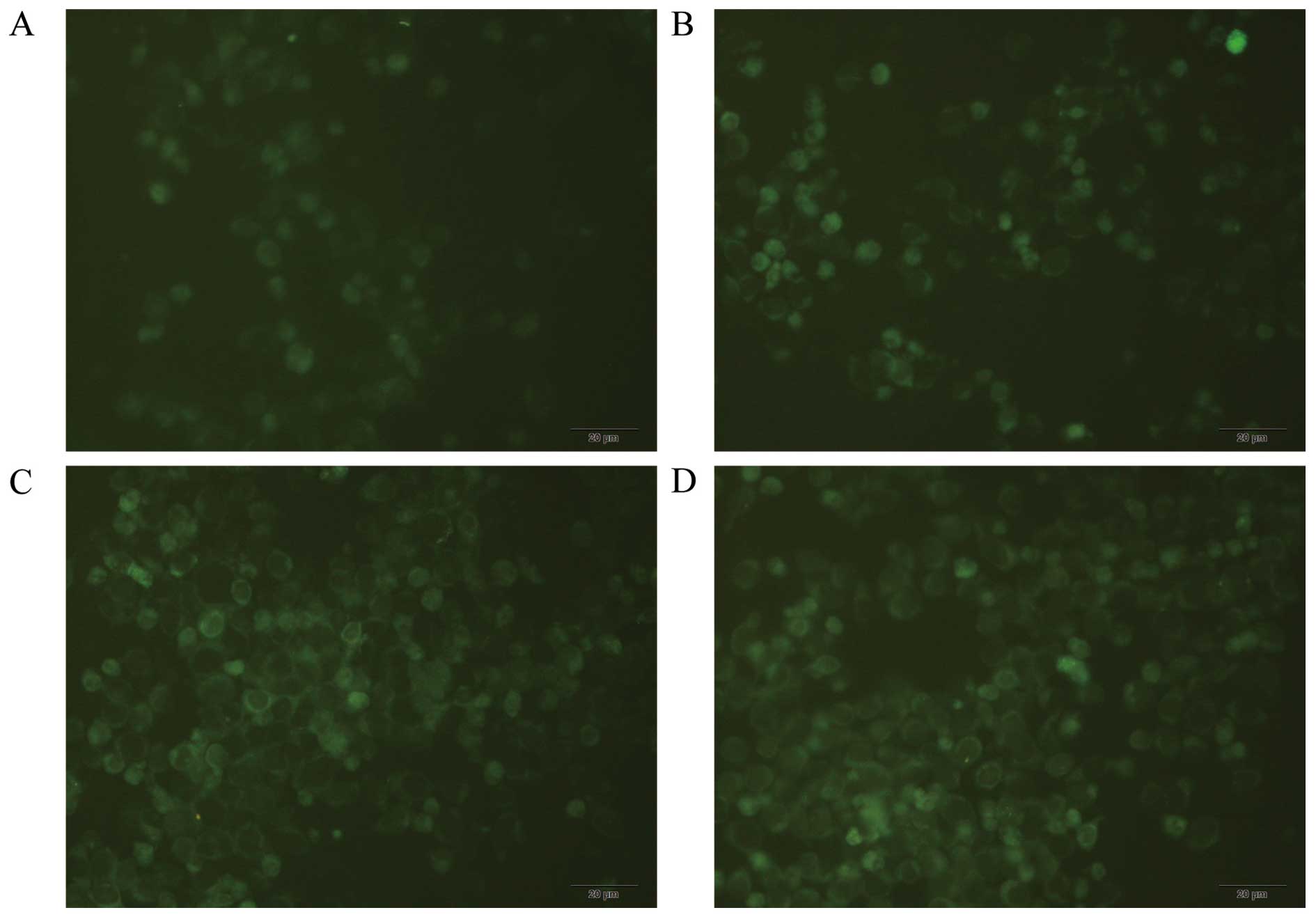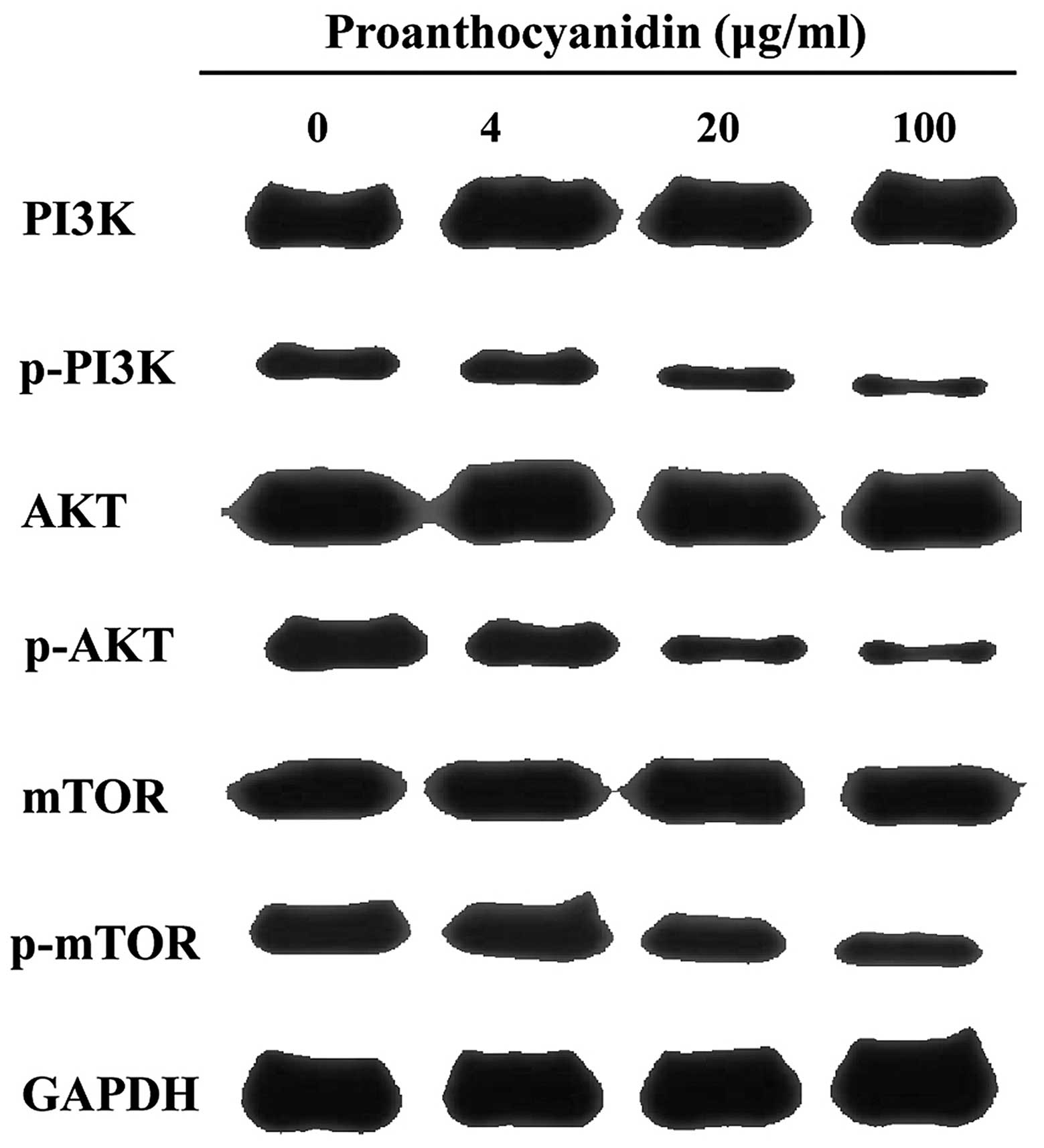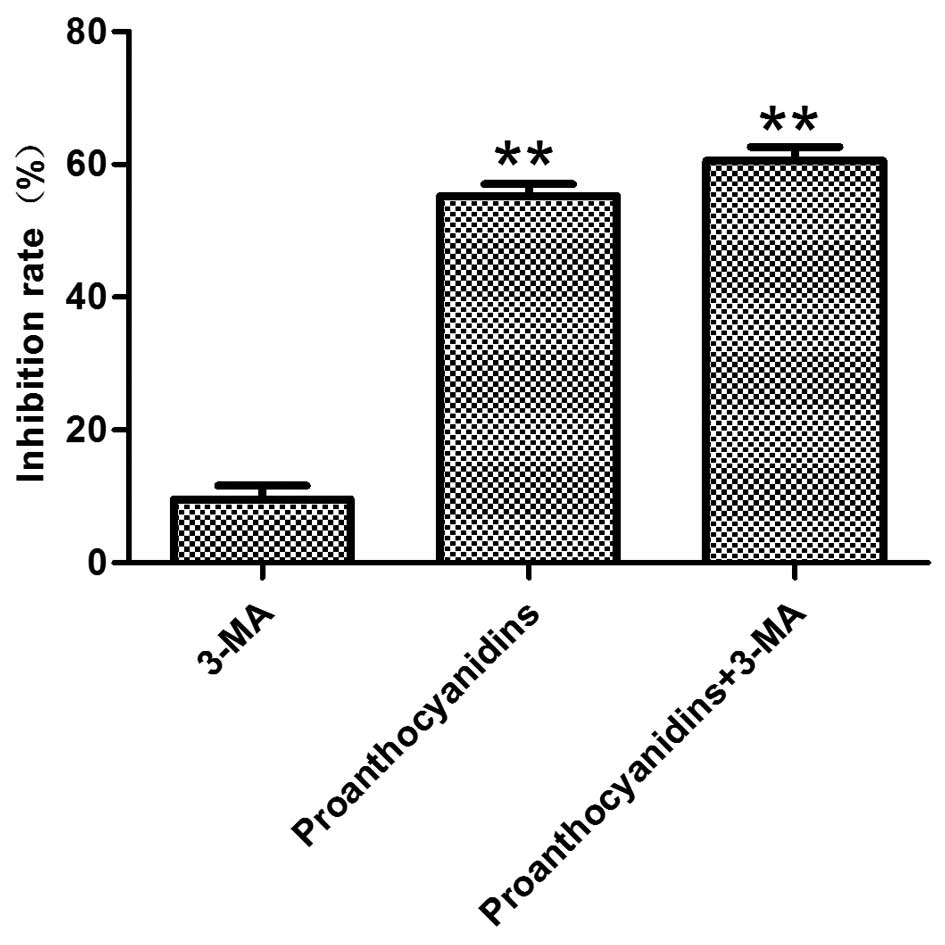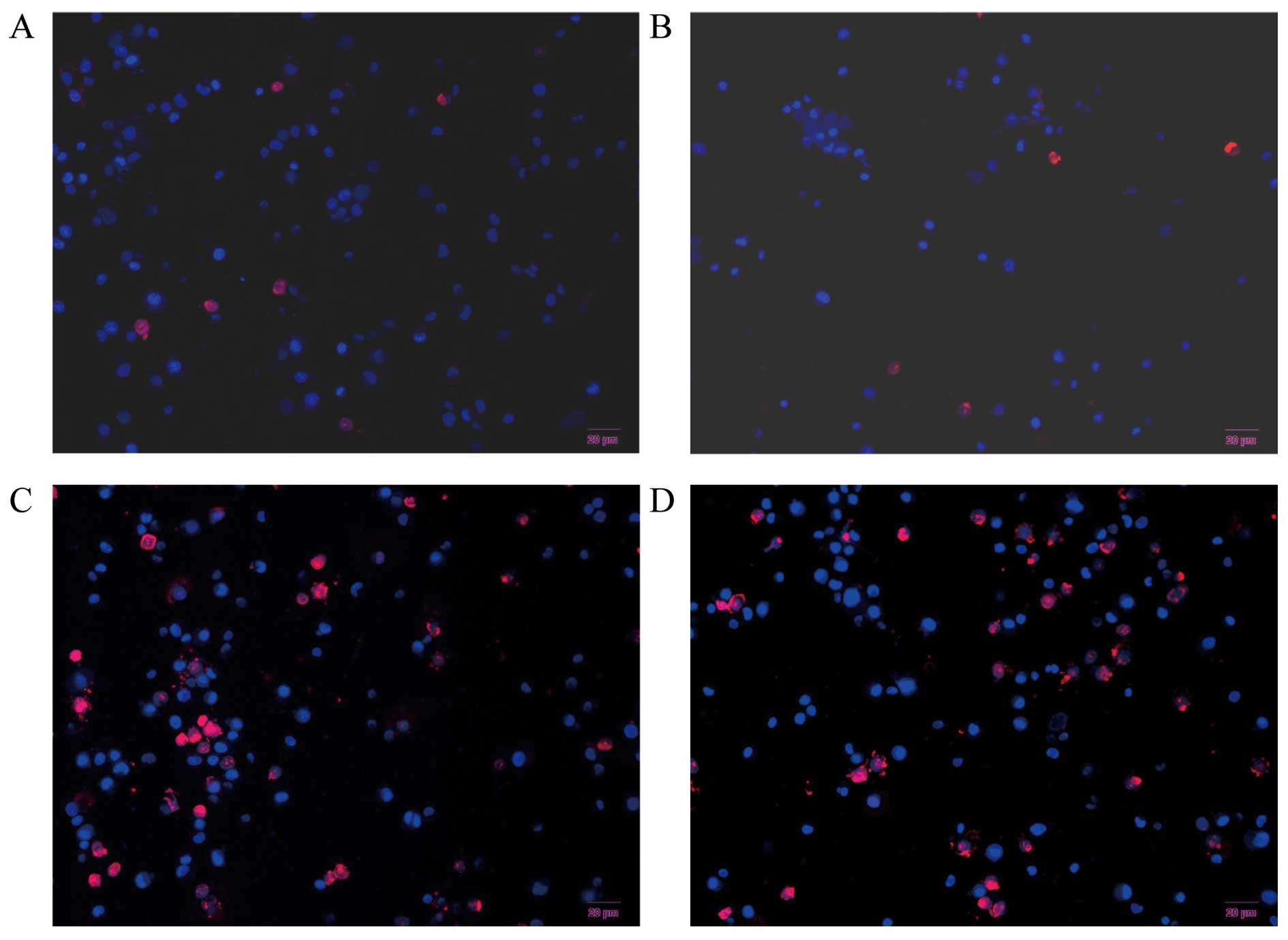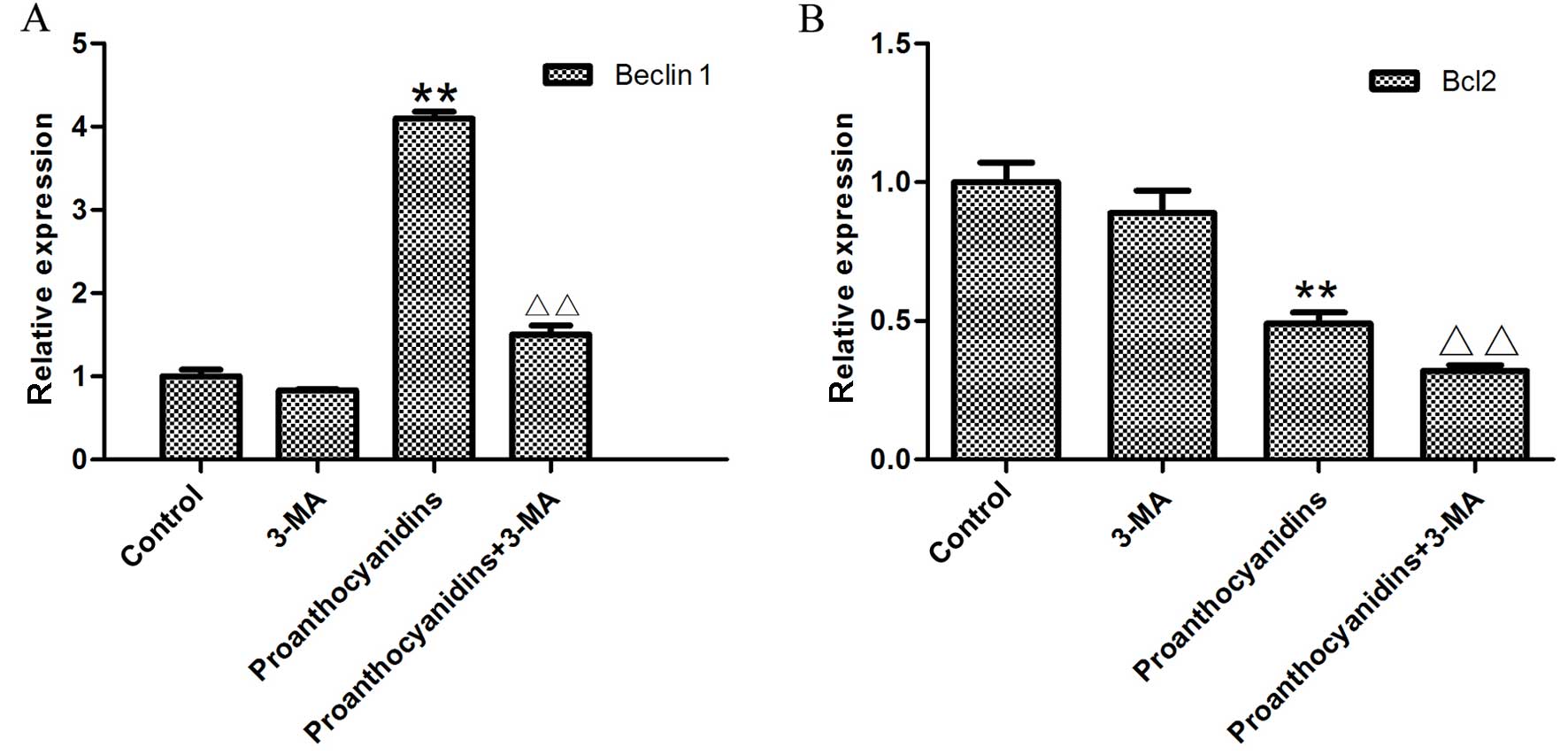|
1
|
Ren JS, Kamangar F, Qiao yL, Taylor PR,
Liang H, Dawsey SM, Liu B, Fan JH and Abnet CC: Serum pepsinogens
and risk of gastric and oesophageal cancers in the General
Population Nutrition Intervention Trial cohort. Gut. 58:636–642.
2009. View Article : Google Scholar : PubMed/NCBI
|
|
2
|
No authors listed. Survival of Cancer
Patients in Europe: The EUROCARE-2 study. IARC Sci Publ. 151:1–572.
1999.
|
|
3
|
Crew KD and Neugut AI: Epidemiology of
gastric cancer. World J Gastroenterol. 12:354–362. 2006.PubMed/NCBI
|
|
4
|
Jemal A, Bray F, Center MM, Ferlay J, Ward
E and Forman D: Global cancer statistics. CA Cancer J Clin.
61:69–90. 2011. View Article : Google Scholar : PubMed/NCBI
|
|
5
|
Zhang J, Li y, Chen X, Liu T, Chen y, He
W, Zhang Q and Liu S: Autophagy is involved in anticancer effects
of matrine on SGC-7901 human gastric cancer cells. Oncol Rep.
26:115–124. 2011.PubMed/NCBI
|
|
6
|
Kawasaki ES and Player A: Nanotechnology,
nanomedicine, and the development of new, effective therapies for
cancer. Nanomedicine. 1:101–109. 2005. View Article : Google Scholar
|
|
7
|
Valentini F, Carbone M and Palleschi G:
Carbon nanostructured materials for applications in nano-medicine,
cultural heritage, and electrochemical biosensors. Anal Bioanal
Chem. 405:451–465. 2013. View Article : Google Scholar
|
|
8
|
Alexis F, Rhee JW, Richie JP,
Radovic-Moreno AF, Langer R and Farokhzad OC: New frontiers in
nanotechnology for cancer treatment. Urol Oncol. 26:74–85. 2008.
View Article : Google Scholar : PubMed/NCBI
|
|
9
|
Chen SL, Fang WW, Ye F, Liu yH, Qian J,
Shan SJ, Zhang JJ, Chunhua RZ, Liao LM, Lin S, et al: Effect on
left ventricular function of intracoronary transplantation of
autologous bone marrow mesenchymal stem cell in patients with acute
myocardial infarction. Am J Cardiol. 94:92–95. 2004. View Article : Google Scholar : PubMed/NCBI
|
|
10
|
Bang OY, Lee JS, Lee PH and Lee G:
Autologous mesenchymal stem cell transplantation in stroke
patients. Ann Neurol. 57:874–882. 2005. View Article : Google Scholar : PubMed/NCBI
|
|
11
|
Kuo TK, Hung SP, Chuang CH, Chen CT, Shih
YR, Fang SC, Yang VW and Lee OK: Stem cell therapy for liver
disease: Parameters governing the success of using bone marrow
mesenchymal stem cells. Gastroenterology. 134:2111–2121.
2121.e1–2121.e3. 2008. View Article : Google Scholar : PubMed/NCBI
|
|
12
|
Shi Y, Moon M, Dawood S, McManus B and Liu
PP: Mechanisms and management of doxorubicin cardiotoxicity. Herz.
36:296–305. 2011. View Article : Google Scholar : PubMed/NCBI
|
|
13
|
Poletti V, Casoni GL, Cancellieri A,
Piciucchi S, Dubini A and Zompatori M: Diffuse alveolar damage.
Pathologica. 102:453–463. 2010.
|
|
14
|
Naranjo TW, Lopera DE, Diaz-Granados LR,
Duque JJ, Restrepo AM and Cano LE: Combined
itraconazole-pentoxifylline treatment promptly reduces lung
fibrosis induced by chronic pulmonary paracoccidioidomycosis in
mice. Pulm Pharmacol Ther. 24:81–91. 2011. View Article : Google Scholar
|
|
15
|
de Pascual-Teresa S, Santos-Buelga C and
Rivas-Gonzalo JC: Quantitative analysis of flavan-3-ols in Spanish
foodstuffs and beverages. J Agric Food Chem. 48:5331–5337. 2000.
View Article : Google Scholar : PubMed/NCBI
|
|
16
|
Li X, Chen D, Wang G and Lu y: Study of
interaction between human serum albumin and three antioxidants:
Ascorbic acid, α-tocopherol, and proanthocyanidins. Eur J Med Chem.
70:22–36. 2013. View Article : Google Scholar
|
|
17
|
Wiesneth S, Petereit F and Jürgenliemk G:
Salix daphnoides: A Screening for Oligomeric and Polymeric
Proanthocyanidins. Molecules. 20:13764–13779. 2015. View Article : Google Scholar : PubMed/NCBI
|
|
18
|
Fernández K, Vega M and Aspé E: An
enzymatic extraction of proanthocyanidins from País grape seeds and
skins. Food Chem. 168:7–13. 2015. View Article : Google Scholar
|
|
19
|
Roopchand DE, Krueger CG, Moskal K,
Fridlender B, Lila MA and Raskin I: Food-compatible method for the
efficient extraction and stabilization of cranberry pomace
polyphenols. Food Chem. 141:3664–3669. 2013. View Article : Google Scholar : PubMed/NCBI
|
|
20
|
Lombardo Bedran TB, Palomari Spolidorio D
and Grenier D: Green tea polyphenol epigallocatechin-3-gallate and
cranberry proanthocyanidins act in synergy with cathelicidin
(LL-37) to reduce the LPS-induced inflammatory response in a
three-dimensional co-culture model of gingival epithelial cells and
fibroblasts. Arch Oral Biol. 60:845–853. 2015. View Article : Google Scholar : PubMed/NCBI
|
|
21
|
Pons Z, Guerrero L, Margalef M, Arola L,
Arola-Arnal A and Muguerza B: Effect of low molecular grape seed
proanthocyani-dins on blood pressure and lipid homeostasis in
cafeteria diet-fed rats. J Physiol Biochem. 70:629–637. 2014.
View Article : Google Scholar : PubMed/NCBI
|
|
22
|
Zhang XY, Li WG, Zheng TZ and Li W:
Effects of proantho-cyanidins on contractile activity of aortic
smooth muscle and platelet aggregation in experimental animals.
Zhongguo ying yong Sheng Li Xue Za Zhi. 21:383–386. 2005.In
Chinese. PubMed/NCBI
|
|
23
|
Mohana T, Navin AV, Jamuna S, Sakeena
Sadullah MS and Niranjali Devaraj S: Inhibition of differentiation
of monocyte to macrophages in atherosclerosis by oligomeric
proanthocyanidins -In-vivo and in-vitro study. Food Chem Toxicol.
82:96–105. 2015. View Article : Google Scholar : PubMed/NCBI
|
|
24
|
de Sá M, Justino V, Spranger MI, Zhao yQ,
Han L and Sun BS: Extraction yields and anti-oxidant activity of
proanthocyanidins from different parts of grape pomace: Effect of
mechanical treatments. Phytochem Anal. 25:134–140. 2014. View Article : Google Scholar
|
|
25
|
Luan yy, Liu ZM, Zhong Jy, Yao Ry and Yu
HS: Effect of grape seed proanthocyanidins on tumor vasculogenic
mimicry in human triple-negative breast cancer cells. Asian Pac J
Cancer Prev. 16:531–535. 2015. View Article : Google Scholar : PubMed/NCBI
|
|
26
|
D'Angelo L, Piazzi G, Pacilli A,
Prossomariti A, Fazio C, Montanaro L, Graziani G, Fogliano V,
Munarini A, Bianchi F, et al: A combination of eicosapentaenoic
acid-free fatty acid, epigallocatechin-3-gallate and
proanthocyanidins has a strong effect on mTOR signaling in
colorectal cancer cells. Carcinogenesis. 35:2314–2320. 2014.
View Article : Google Scholar : PubMed/NCBI
|
|
27
|
Huang S, Yang N, Liu y, Gao J, Huang T, Hu
L, Zhao J, Li y, Li C and Zhang X: Grape seed proanthocyanidins
inhibit colon cancer-induced angiogenesis through suppressing the
expression of VEGF and Ang1. Int J Mol Med. 30:1410–1416.
2012.PubMed/NCBI
|
|
28
|
Sharma SD and Katiyar SK: Dietary grape
seed proanthocy-anidins inhibit UVB-induced cyclooxygenase-2
expression and other inflammatory mediators in UVB-exposed skin and
skin tumors of SKH-1 hairless mice. Pharm Res. 27:1092–1102. 2010.
View Article : Google Scholar : PubMed/NCBI
|
|
29
|
Zhang XY, Li WG, Wu YJ and Gao MT:
Amelioration of doxorubicin-induced myocardial oxidative stress and
immunosuppression by grape seed proanthocyanidins in tumour-bearing
mice. J Pharm Pharmacol. 57:1043–1052. 2005. View Article : Google Scholar : PubMed/NCBI
|
|
30
|
Shen S, Kepp O, Michaud M, Martins I,
Minoux H, Métivier D, Maiuri MC, Kroemer RT and Kroemer G:
Association and dissociation of autophagy, apoptosis and necrosis
by systematic chemical study. Oncogene. 30:4544–4556. 2011.
View Article : Google Scholar : PubMed/NCBI
|
|
31
|
Chiantore MV, Vannucchi S, Mangino G,
Percario ZA, Affabris E, Fiorucci G and Romeo G: Senescence and
cell death pathways and their role in cancer therapeutic outcome.
Curr Med Chem. 16:287–300. 2009. View Article : Google Scholar : PubMed/NCBI
|
|
32
|
Klionsky DJ: Autophagy: From phenomenology
to molecular understanding in less than a decade. Nat Rev Mol Cell
Biol. 8:931–937. 2007. View Article : Google Scholar : PubMed/NCBI
|
|
33
|
Levine B and Kroemer G: Autophagy in the
pathogenesis of disease. Cell. 132:27–42. 2008. View Article : Google Scholar : PubMed/NCBI
|
|
34
|
Wang MC, Wu AG, Huang YZ, Shao GL, Ji SF,
Wang RW, Yuan HJ, Fan XL, Zheng LH and Jiao QL: Autophagic
regulation of cell growth by altered expression of Beclin 1 in
triple-negative breast cancer. Int J Clin Exp Med. 8:7049–7058.
2015.PubMed/NCBI
|
|
35
|
Sui H, Shi C, Yan Z and Li H: Combination
of erlotinib and a PARP inhibitor inhibits growth of A2780 tumor
xenografts due to increased autophagy. Drug Des Devel Ther.
9:3183–3190. 2015. View Article : Google Scholar : PubMed/NCBI
|
|
36
|
Zheng JF, Li LL, Lu J, Yan K, Guo WH and
Zhang JX: XPD functions as a tumor suppressor and dysregulates
autophagy in cultured HepG2 cells. Med Sci Monit. 21:1562–1568.
2015. View Article : Google Scholar : PubMed/NCBI
|
|
37
|
Rosenfeldt MT and Ryan KM: The multiple
roles of autophagy in cancer. Carcinogenesis. 32:955–963. 2011.
View Article : Google Scholar : PubMed/NCBI
|
|
38
|
Duan Y, Ke J, Zhang H, He Y, Sun G and Sun
X: Autophagic cell death of human hepatoma G2 cells mediated by
procyanidins from Castanea mollissima Bl. Shell-induced reactive
oxygen species generation. Chem Biol Interact. 224:13–23. 2014.
View Article : Google Scholar : PubMed/NCBI
|
|
39
|
Mizushima N: Methods for monitoring
autophagy. Int J Biochem Cell Biol. 36:2491–2502. 2004. View Article : Google Scholar : PubMed/NCBI
|
|
40
|
Eskelinen EL and Saftig P: Autophagy: A
lysosomal degradation pathway with a central role in health and
disease. Biochim Biophys Acta. 1793:664–673. 2009. View Article : Google Scholar
|
|
41
|
He H, Dang Y, Dai F, Guo Z, Wu J, She X,
Pei Y, Chen Y, Ling W, Wu C, et al: Post-translational
modifications of three members of the human MAP1LC3 family and
detection of a novel type of modification for MAP1LC3B. J Biol
Chem. 278:29278–29287. 2003. View Article : Google Scholar : PubMed/NCBI
|
|
42
|
Zheng HY, Zhang XY, Wang XF and Sun BC:
Autophagy enhances the aggressiveness of human colorectal cancer
cells and their ability to adapt to apoptotic stimulus. Cancer Biol
Med. 9:105–110. 2012.
|
|
43
|
Gozuacik D and Kimchi A: Autophagy as a
cell death and tumor suppressor mechanism. Oncogene. 23:2891–2906.
2004. View Article : Google Scholar : PubMed/NCBI
|
|
44
|
Zhang Z, Zheng L, Zhao Z, Shi J, Wang X
and Huang J: Grape seed proanthocyanidins inhibit
H2O2-induced osteoblastic MC3T3-E1 cell
apoptosis via ameliorating H2O2-induced
mitochondrial dysfunction. J Toxicol Sci. 39:803–813. 2014.
View Article : Google Scholar
|
|
45
|
Chen Q, Liu XF and Zheng PS: Grape seed
proanthocyanidins (GSPs) inhibit the growth of cervical cancer by
inducing apoptosis mediated by the mitochondrial pathway. PLoS One.
9:e1070452014. View Article : Google Scholar : PubMed/NCBI
|
|
46
|
Prasad R, Vaid M and Katiyar SK: Grape
proanthocyanidin inhibit pancreatic cancer cell growth in vitro and
in vivo through induction of apoptosis and by targeting the
PI3K/Akt pathway. PLoS One. 7:e430642012. View Article : Google Scholar : PubMed/NCBI
|
|
47
|
Kim ME, Ha TK, Yoon JH and Lee JS:
Myricetin induces cell death of human colon cancer cells via
BAX/BCL2-dependent pathway. Anticancer Res. 34:701–706.
2014.PubMed/NCBI
|
|
48
|
Choi YJ, Saez B, Anders L, Hydbring P,
Stefano J, Bacon NA, Cook C, Kalaszczynska I, Signoretti S, Young
RA, et al: D-cyclins repress apoptosis in hematopoietic cells by
controlling death receptor Fas and its ligand FasL. Dev Cell.
30:255–267. 2014. View Article : Google Scholar : PubMed/NCBI
|
|
49
|
Yao W, Yue P, Zhang G, Owonikoko TK, Khuri
FR and Sun SY: Enhancing therapeutic efficacy of the MEK inhibitor,
MEK162, by blocking autophagy or inhibiting PI3K/Akt signaling in
human lung cancer cells. Cancer Lett. 364:70–78. 2015. View Article : Google Scholar : PubMed/NCBI
|
|
50
|
Xin M and Deng X: Nicotine inactivation of
the proapoptotic function of Bax through phosphorylation. J Biol
Chem. 280:10781–10789. 2005. View Article : Google Scholar : PubMed/NCBI
|
|
51
|
Song G, Ouyang G and Bao S: The activation
of Akt/PKB signaling pathway and cell survival. J Cell Mol Med.
9:59–71. 2005. View Article : Google Scholar : PubMed/NCBI
|
|
52
|
Pan ST, Qin Y, Zhou ZW, He ZX, Zhang X,
Yang T, Yang YX, Wang D, Qiu JX and Zhou SF: Plumbagin induces
G2/M arrest, apoptosis, and autophagy via p38 MAPK- and
PI3K/Akt/mTOR-mediated pathways in human tongue squamous cell
carcinoma cells. Drug Des Devel Ther. 9:1601–1626. 2015.
|
|
53
|
Zhou ZW, Li XX, He ZX, Pan ST, Yang Y,
Zhang X, Chow K, Yang T, Qiu JX, Zhou Q, et al: Induction of
apoptosis and autophagy via sirtuin1- and PI3K/Akt/mTOR-mediated
pathways by plumbagin in human prostate cancer cells. Drug Des
Devel Ther. 9:1511–1554. 2015. View Article : Google Scholar : PubMed/NCBI
|
|
54
|
Yuan L, Wei S, Wang J and Liu X:
Isoorientin induces apoptosis and autophagy simultaneously by
reactive oxygen species (ROS)-related p53, PI3K/Akt, JNK, and p38
signaling pathways in HepG2 cancer cells. J Agric Food Chem.
62:5390–5400. 2014. View Article : Google Scholar : PubMed/NCBI
|
|
55
|
Zhang H, Guo M, Chen JH, Wang Z, Du XF,
Liu PX and Li WH: Osteopontin knockdown inhibits αv,β3
integrin-induced cell migration and invasion and promotes apoptosis
of breast cancer cells by inducing autophagy and inactivating the
PI3K/Akt/mTOR pathway. Cell Physiol Biochem. 33:991–1002. 2014.
View Article : Google Scholar
|
|
56
|
Hu Y, Li L, Yin W, Shen L, You B and Gao
H: Protective effect of proanthocyanidins on anoxia-reoxygenation
injury of myocardial cells mediated by the PI3K/Akt/GSK-3β pathway
and mitochondrial ATP-sensitive potassium channel. Mol Med Rep.
10:2051–2058. 2014.PubMed/NCBI
|
|
57
|
Zhong Y, Wang QJ and Yue Z: Atg14L and
Rubicon: yin and yang of Beclin 1-mediated autophagy control.
Autophagy. 5:890–891. 2009. View Article : Google Scholar : PubMed/NCBI
|
|
58
|
Liang XH, Jackson S, Seaman M, Brown K,
Kempkes B, Hibshoosh H and Levine B: Induction of autophagy and
inhibition of tumorigenesis by beclin 1. Nature. 402:672–676. 1999.
View Article : Google Scholar : PubMed/NCBI
|
|
59
|
Baspinar S, Bircan S, Orhan H, Kapucuoglu
N and Bozkurt KK: The relation of beclin 1 and bcl-2 expressions in
high grade prostatic intraepithelial neoplasia and prostate
adenocarcinoma: A tissue microarray study. Pathol Res Pract.
210:412–418. 2014. View Article : Google Scholar : PubMed/NCBI
|
|
60
|
Fukui M, Yamabe N, Choi HJ, Polireddy K,
Chen Q and Zhu BT: Mechanism of ascorbate-induced cell death in
human pancreatic cancer cells: Role of Bcl-2, Beclin 1 and
autophagy. Planta Med. 81:838–846. 2015. View Article : Google Scholar : PubMed/NCBI
|
|
61
|
Tian PG, Jiang ZX, Li JH, Zhou Z and Zhang
QH: Spliced XBP1 promotes macrophage survival and autophagy by
interacting with Beclin-1. Biochem Biophys Res Commun. 463:518–523.
2015. View Article : Google Scholar : PubMed/NCBI
|
|
62
|
Patro SC, Pal S, Bi Y, Lynn K, Mounzer KC,
Kostman JR, Davuluri RV and Montaner LJ: Shift in monocyte
apoptosis with increasing viral load and change in
apoptosis-related ISG/Bcl2 family gene expression in chronically
HIV-1-infected subjects. J Virol. 89:799–810. 2015. View Article : Google Scholar :
|
|
63
|
Chaudhary P and Vishwanatha JK: c-Jun
NH2-terminal kinase-induced proteasomal degradation of c-FLIPL/S
and Bcl2 sensitize prostate cancer cells to Fas- and
mitochondria-mediated apoptosis by tetrandrine. Biochem Pharmacol.
91:457–473. 2014. View Article : Google Scholar : PubMed/NCBI
|
|
64
|
Lin W and Tongyi S: Role of Bax/Bcl-2
family members in green tea polyphenol induced necroptosis of
p53-deficient Hep3B cells. Tumour Biol. 35:8065–8075. 2014.
View Article : Google Scholar : PubMed/NCBI
|
|
65
|
Hua F, Cornejo MG, Cardone MH, Stokes CL
and Lauffenburger DA: Effects of Bcl-2 levels on Fas
signaling-induced caspase-3 activation: Molecular genetic tests of
computational model predictions. J Immunol. 175:985–995. 2005.
View Article : Google Scholar : PubMed/NCBI
|
|
66
|
Park SE, Shin WT, Park C, Hong SH, Kim Gy,
Kim SO, Ryu CH, Hong SH and Choi YH: Induction of apoptosis in
MDA-MB-231 human breast carcinoma cells with an ethanol extract of
Cyperus rotundus L. by activating caspases. Oncol Rep.
32:2461–2470. 2014.PubMed/NCBI
|















